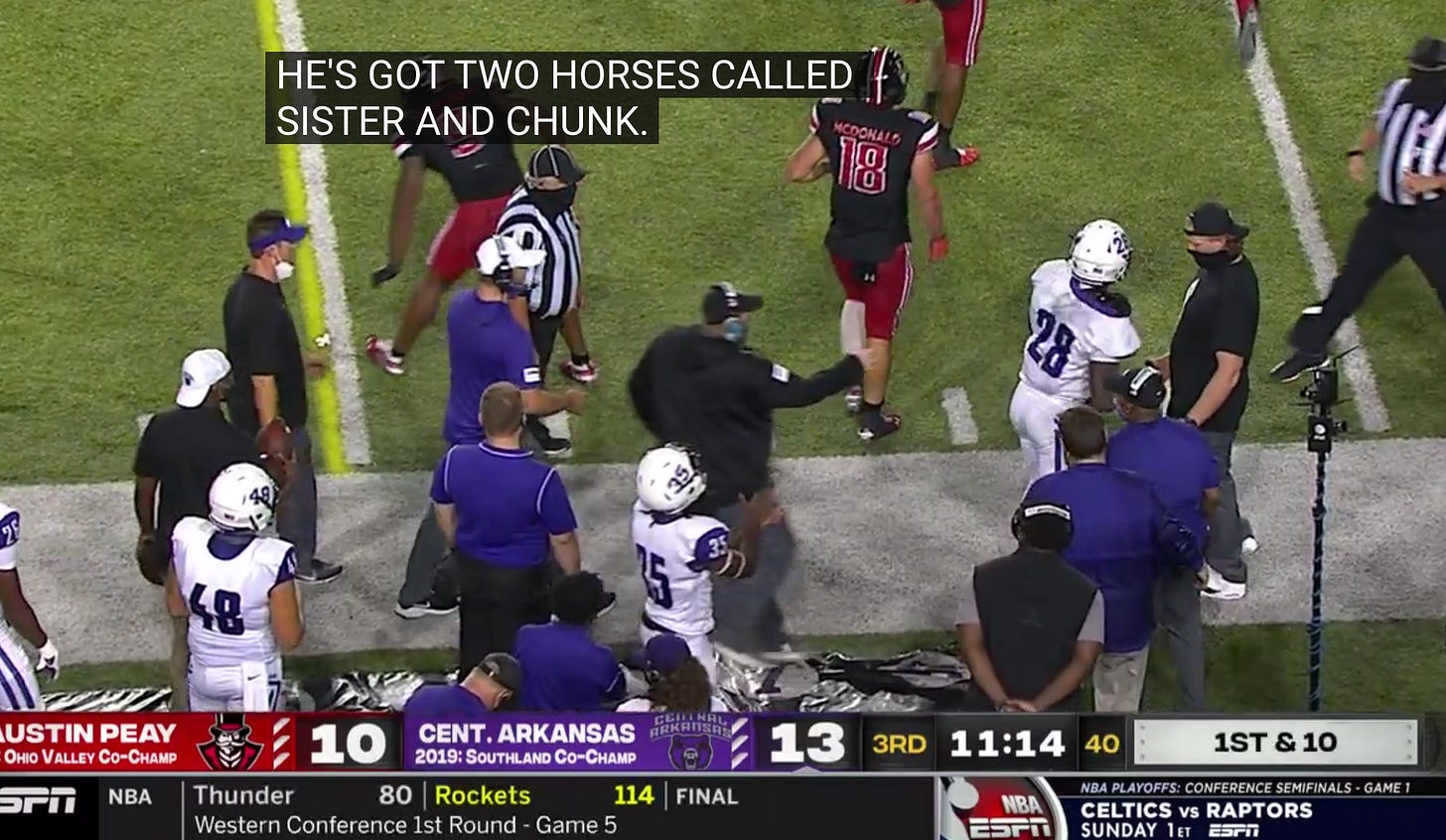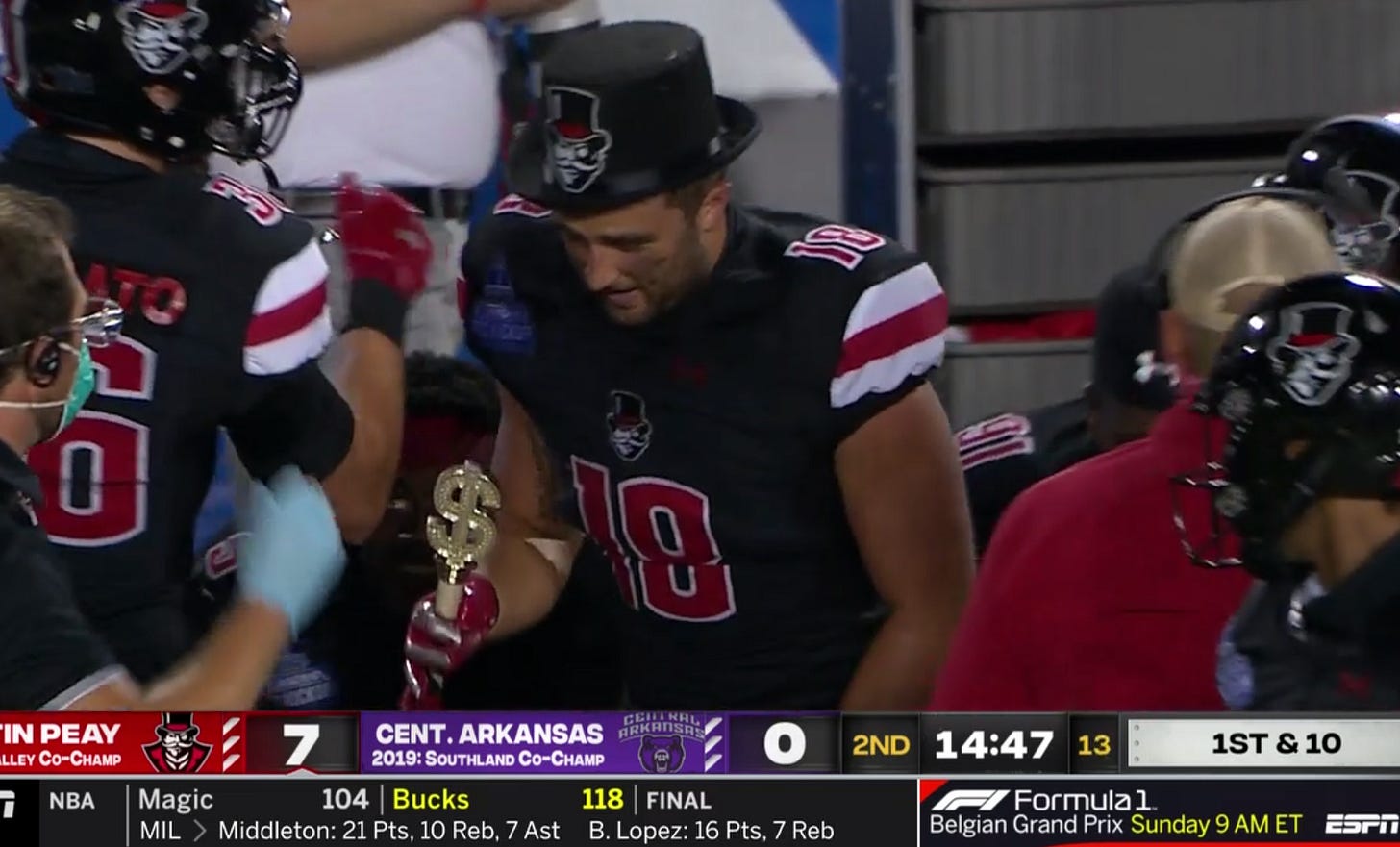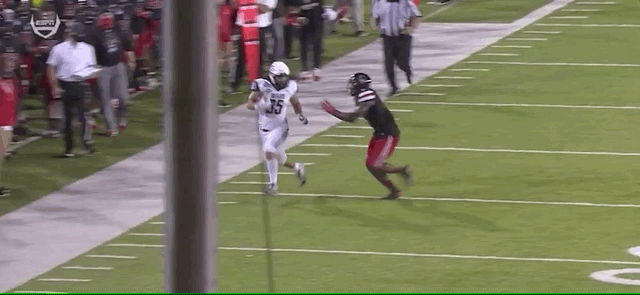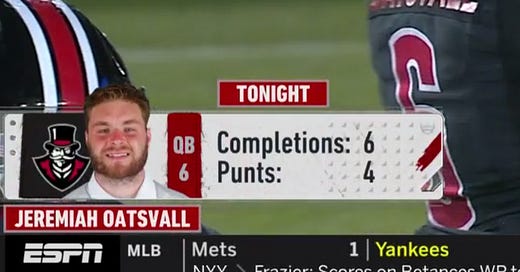Greetings, and thank you for reading.
If you’ve finished the Sinful Seven, tell a friend to give it a shot! Its new price is $14.99, it’s now at Apple Books, and it’ll likely be up at a couple other major retailers soon (though the package of files available at Gumroad includes versions fit for any device already). We’re also still happily basking in the warm memory of giving a percentage of our preorder funds, $14,819.97, to Feeding America. Thanks to you!
Moon Crew is a worker-owned, four-person — at the moment, but maybe five or 50 or 5,000,000 some day!! — bloggin’ collective. If you’d like to support this free newsletter, the free Shutdown Fullcast universe, and hopefully other stuff, you may slide us a few bucks at our Ko-fi. One benefit we’re working on for monthly donors, hopefully live within the next couple weeks: a Discord, where our community can chat during gamedays and pretty much whenever else (in Canimals/Nonsense fashion, iykyk), and where we can also try out Conference Calls, movie watchalongs, and other stuff. Sinful Seven book club! Other book clubs! Vacation Bible School Wednesday night Bible study, with juice box check!
There’s at least one other donor benefit we plan to do, and surely we’ll try other stuff down the road. Thank you as always.
A question I’ve seen posed a few different ways, asked in faiths both good and bad:
If some of us think 2020 college football is probably a bad idea, how can we justify tuning in to make GIFs of something as deliberately unnecessary as Austin Peay-Central Arkansas?

First, let’s acknowledge this isn’t exactly a new question, maybe minus the “GIFs of Austin Peay-Central Arkansas” part. (They had never met until 2019, thus never challenging the ethicists of old.) How can we support dumb ideas, even if the impact of our support is scant?
“There is no such thing as ethical consumption under capitalism,” some of my most online friends have often said about any number of things, from fast food to Marvel movies to college sports. At some point in the supply chain, everything sucks at least a little bit! To live blamelessly requires moving deep into the hills and apologizing to the ants for disturbing them with the sound of footsteps.
“Meaningless! Meaningless. Utterly meaningless! Everything is meaningless,” another friend has said. “For what advantage has the wise man over the fool?”
So just give up and do whatever, right?
But then again, a boycott is a powerful weapon.
And beyond all that, if enjoying something is simply too tall a task for someone’s conscience, any back-and-forth is beside the point. I certainly don’t want to agitate for you to enjoy something you’re uncomfortable with. Many of my friends tapped out on college football fandom within the last decade, with no quarrel from me. All I can share is how I feel about this.

There is nothing close to a national semi-consensus on how the sport should work in this pandemic, which continues to make the 1918 pandemic look downright orderly.
Is it safe? It’s surely less safe than usual, though no two people agree on the likeliest percentage of Safety Meter decrease, especially since we have little idea about the virus’ potential long-term effects.
Is it gonna get some big institution sued? That’s pretty much always a possibility, though it now feels likelier than ever before.
Is it awkward? That universities appear to be in the process of piling kids onto campus, charging them tuition, booting the non-profitable non-athletes, and keeping the profitable athletes? It takes a lot to move the needle in 2020, but yes, I think this does it.
Is it legitimate? If there’s no football for half of FBS, most of Division I, and basically everybody else, does that decrease the value of the football that is being played? It might make each game feel more precious, sure. But if all this is building toward nearly empty stadiums and the most-asterisked trophies in the sport’s history (which is saying a lot), does that make this feel like not just More To Risk, but also Less To Gain?
Is it fair? Is it what?

For me, part of the question comes down to this (for now, at least): Do players want to play? I think it’s clear that they do.
That doesn’t mean I think the will of Big Ten players should be solely enough to direct the conference or that the SEC is forging ahead because of its big, egalitarian heart. Individual conferences are making branding decisions — the Big Ten continues to put all its Create-A-Conference points into Wisdom, while the SEC will always hammer Passion — and will update those branding decisions periodically.
I also don’t mean we should assume individual coaching staffs will follow tip-top protocols without being held accountable. We should listen closely when some players express concerns. We should also acknowledge there is no set of bubble-grade protocols that can even be applied within amateurism.
I just mean this, and even this is tentative:
A full 2020 football season seems unlikely to be proved wise, realistic, or worthwhile. But if players opt into taking the field for a few weeks, and if they can do so without increasing campus virus spread, I’m not sure what would entitle me to judge their decision, with the large addendum that this only really applies if players feel they have the agency to speak up about their surroundings.
And once they’re on the field for a few weeks, I hope all their punts are interesting to look at. We’ll then go from there, doing what we usually do, winging it while banking on miracles.
Yet another addendum: We’ll see how all that holds up over those few weeks, as we learn more about the degree to which semi-bubble football is a virus-spreader. It’s possible there comes a point when players wanting to play is irrelevant, and it’s possible that point arrives quickly.

Austin Peay QB Jeremiah Oatsvall ended up punting seven times. The reason: his team was out of long snappers due to virus quarantine.
How can we enjoy college football in 2020 if college football in 2020 is a bad idea?
In 2020, college football is dangerous, exploitative, unfair, mismanaged, politicized, and a thousand other adjectives.
And all of those adjectives applied in 2019 as well, to differing degrees.
And 2018.
And 2017.
And 2016, 2015, 2014, and 2013.
And [zoom zoom zoom] the 1800s.
On the one hand, coming to terms with something once doesn’t necessitate coming to terms with it forever. 2020 might be too far. 2021, 2022, and 2023 might as well.
On the other, we’ve already established we all like bad ideas. At this point, are we just haggling?
Oh, and this doesn’t apply just to football. This applies to just about every system we have. It’s all riddled with bad ideas.
The only way to improve any of these systems, including football, is to support the people working and living on the ground, whether we’re watching them or not.
Anyway, what do you think?






I think this is a great take. College football (this year especially) is infinitely complicated. Consuming it neither aligns you with the gods nor condemns you forever. In general follow labor’s lead.
I respect the players that play. I respect the ones that opt out. None of this needs to happen, but whatever we get of our big, dumb, beautiful sport this year I will appreciate.